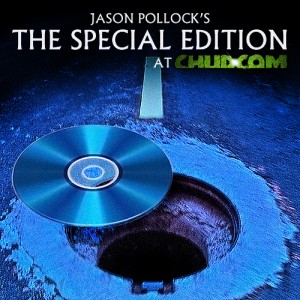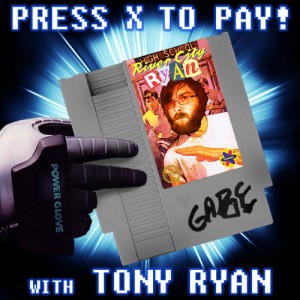This week, Disney drops some stuff that they didn’t license off to Echo Bridge/Mill Creek. Maybe this stuff was profitable enough for them to do their own shitty HD masters and dump big boxes of ’em at big box retailers? No one knows…
ADVENTURES IN BABYSITTING: 25th ANNIVERSARY EDITION
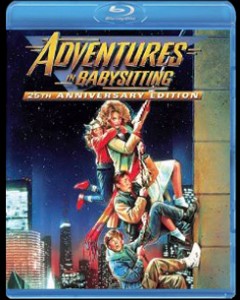
The one-two punch of Catherine Mary Stewart in The Last Starfighter and Night of the Comet may have proven to me that girls weren’t icky, but Elisabeth Shue in Adventures in Babysitting presented the template for the Dream Girl. Smart, funny, resourceful, already dating some utter bag-of-douche – this seems to be what I’ve chased after my entire life. Maybe I should just start chasing Elisabeth Shue, instead?
You might be wondering what the “25th Anniversary Edition” entails. Deleted scenes, Shue’s video audition, a Columbus/Shue commentary, a vintage EPK, and a cast reunion…all of that seems like too much to ask of the Rat Trap this time around. You get none of that. As a matter of fact – you get nothing.
The “sensational new digital restoration” amounts to a dull master from aged elements, with blacks so crushed you’d think someone pushed the “contrast” slider all the way to the right and said “fuck it.”
Oh well, the DVD was non-anamorphic and ugly as a dried turd, so I guess this is a step up – just not to the streets.
THE BOOGENS
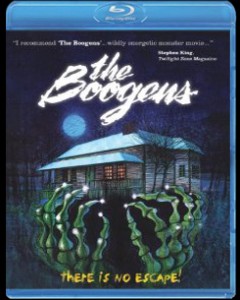
Sometimes we worry that so many cherished cult films will never survive over formats. We fear that, if a film didn’t make it to DVD, it will never show up on Blu Ray. The Boogens is here to say “FUCK YOU – I’M THE BOOGENS!”
This is an charming little monster romper with goofy/awesome/adorable creatures and a bit of the enchanting Bride of Crichton, Dori Doreau. Check it out.
GROSSE POINTE BLANK: 15th ANNIVERSARY EDITION
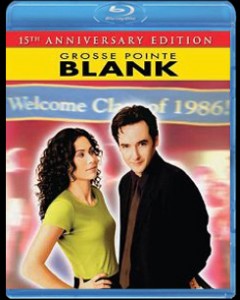
This is a film that I’ve adored with every beat of my heart since the first time I saw it – and the older I get, the more it speaks to me. It is, in many ways, the marriage of so many things I hold dear, and…
Whoa…what? Someone writing about movies on the Internet is about to begin a self-absorbed digression? It can’t be!
It could be said that men of a certain age (and a certain disposition) saw a certain film and understood that, woven into the genetic code of that film…was the guide for being a man.
I want you to understand that I’m talking here about men – not “bros”, “dudes”, or “guys” – but men; that rare breed of male who understands honor and honesty…who can solve problems with his mind and his heart – but who also understands the purity of the clenched fist…who has self-respect and respect for others, regardless of race, gender, or orientation…who has the strength of character and the courage to stand for a thing when it’s the right thing but not the popular thing.
A man understands that when a woman is angry at him, it’s not her “time of the month” – it may actually be something he did. And a man would do whatever it took to fix it – with that peculiar combination of strength and compassion that comes with trying to figure things out for yourself along the way rather than simply regurgitating the values of skewed parentage or a screwed society. You knew that way was wrong when they tried selling it to you.
Men. Some of them, they watched Say Anything when they were young. And they saw John Cusack in that film, and how people in the film saw him, and they realized maybe not “who” to be – they didn’t play dress up – but more like “how” to be. Lloyd Dobler was no bullshit. Lloyd was no compromise. Lloyd was heart-on-sleeve compassion. Lloyd had friends from all walks of life – the bullshit social lines that meant so much to so many had no effect on him. Lloyd wasn’t a blustering, boisterous asshole or bully – even though he was training with Benny “The Jet” Urquidez, so obviously he could take you out.
Say Anything has always seemed to me a repudiation of the Reagan-era values of its day – there is obvious class struggle in the awkward romance between Lloyd and Diane, and her father cloaks his white collar criminality in the “doing what is necessary” blather of the Right. He scammed his way to fiscal gain with a self-righteous smirk, convinced that what he was doing harmed no one. On the other hand, Lloyd and Diane represent innocence and virtue and maybe a bright new day – and yet, their last moment (and the film’s last shot), speaks to a nervy uncertainty.
I’ve always seen Grosse Pointe Blank as the fractured spiritual sequel to Say Anything. I see Lloyd freaking out and leaving Diane because of feelings of social/intellectual inadequacy and fear of commitment – and then he joins the military and basically compromises everything he stands for – eventually losing himself completely. Martin Blank is Lloyd Dobler after the rah-rah Reagan-era bullshit fucks him and early ’90s ennui reaches into his rib cage and squeezes the life out of his barely-beating (but no longer bleeding) heart. He returns to his town of origin to discover the self-styled iconoclasts have become real-estate goons and car dealers – and the only one keeping it real (based solely on her fantastic music taste) is the woman he left behind. Debi Newberry (a radiant Minnie Driver) asks “Where are all the good men dead – In the heart, or in the head?” For Martin, the answer is obviously “both.” Grosse Pointe Blank chronicles his flailing attempts to reclaim himself as a man of worth, all the while being hunted by a couple of Feds – and his old kickboxing instructor, Benny “The Jet” Urquidez.
The sell-out stigma and how to deal with it is an element of more than a couple of Cusack vehicles, I think because the actor has done so much of it himself. The idea that he spent the early ‘80s playing the iconoclast – rocking his Clash T-shirts and showing up in Suicidal Tendencies videos (back when both of those things were seen as pretty un-commercial activities)…only to wind up playing second fiddle to shitty CG in a Roland Emmerich film – or leveraging the memory of Say Anything’s love story in a series of cruddy romantic comedies…I imagine that Cusack, who often seems tense and terse in interviews – and who seems almost to delight in throwing some of his more brilliant/anarchic work under the bus (the guy hates his Savage Steve Holland collaborations) – feels exactly like Martin Blank. Looking at his filmography, it’s safe to say that, if Grosse Pointe Blank isn’t his finest film, it’s certainly his last great one. I feel like everything that guy ever believed in is on display in Blank, and that he’s obviously at war with the impulse to be the gun for hire he eventually became. It’s a struggle everyone who believes themselves a man of integrity has to face, and Cusack’s cinematic counterpart fights that good fight as Cusack himself once did.
Like Adventures in Babysitting, the transfer here is fairly crappo – with some bubbly print damage adding to the overall blandness. And here’s a kooky “Fun Fact” for ye’ – the disc has a special features section with nothing in it. There’s an “INFO” tab that, when you select it, takes you to a commentary disclaimer for a disc with no commentary.
Thanks, Disney – please eat a whole poop at your earliest convenience.
JOHNNY GUITAR
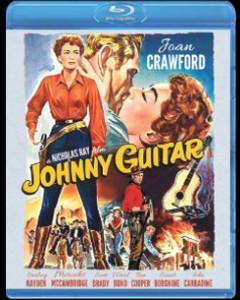
Nicholas Ray makes the “villain” the hero and a woman (but maybe she’s only the villain because she’s a woman) – or as much of a woman as Joan Crawford was in 1954. I’d think she was more demoness by then. I think Sterling Hayden would agree.
The gender swap makes for some subtextual shenanigans, and Ray’s work is arguably more garishly arch here than on Rebel Without a Cause – but there is, to me, a bit of a lefty throughline about power and control here that resonates. Today, it feels a bit like a swipe at anti-intellectualism. Crawford’s Vienna is representative of a progress (she’s a saloon owner who advocates the railroad coming to her dusty western town) that elements of the townfolk resist. At first it seems they fear the rail because they worry their simple, idyllic way of life will fall apart – but there’s more to it than that. If the railroad runs through, cattle ranching dies out – and the balance of power is upended. The last thing a few powerful people want is many more powerful people.
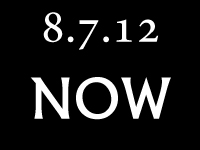
Adventures In Babysitting
Alvarez Radvanovsky: Verdi: Ll Trovatore
Benji: Off The Leash!
Blue Like Jazz
Blues Brothers 2000
The Boogens
Born 2 Race
Bound – Tilly and Gershon fall in love and still try to fuck Joey Pants. Great Neo-noir. Own it.
Clue
Grimm: Season One – I’ve heard good things. Give it a try?
Grosse Pointe Blank
High Fidelity
The Incredible Mr. Limpet – I wish, I wish, I wish I was High Def. BUY IT FROM AMAZON!
Johnny Guitar
Killing Bono
The Lorax
Marley – enjoy this feature-length dorm-room poster. Are you there Jah – it’s me Ras Trent.
Mr. Hush
The Preacher’s Wife
Romy And Michele’s High School Reunion – what are the odds Disney gave this film a shitty transfer, too?
Sebastiane
Steve Niles’ Remains
Strike Back: Cinemax Season One – 24 with tits. America…fuck.
The Tempest
Warriors of the Rainbow
We Walk the Line: A Celebration of Johnny Cash
The World God Only Knows: Season 2
BOB MARLEY – MARLEY (SOUNDTRACK)
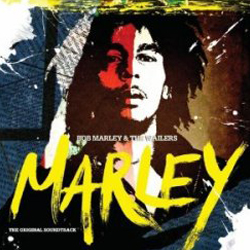
Like his rough contemporary Fela Kuti, Bob Marley became an international figurehead and brand name for his genre of American-influenced African-based music. Like Fela, he survived an assassination attempt, but still more or less fell as a martyr. Fela, though, was a restless musical magpie and political gadfly, channeling his rage into half-hour tirades, brimming with vituperation and indefatigable musical experimentation. Marley, though he never succumbed to the sanctimony of many of his acolytes, did find himself more comfortable in the role of international statesman, a voice for tolerance rather than revolution, in the process rounding the corners of his earlier music; where Peter Tosh or Winston Rodney pulse fury through every beat, late-period Marley encourages you to think and reflect on a world of injustice: fundamentally, he hoped that enlightenment could change attitudes and open hearts, where his peers had few such expectations, and demanded more. Thus, the release of the Marley documentary coincides with yet another recycling of his best-known material (I gave up browsing Amazon after five pages of 2012 Marley reissues): always intelligent, invariably compassionate, but (in the studio) rarely as exciting as the work of his youth, or of what he could deliver in a live performance. I haven’t seen Marley yet, which arrives on DVD and Blu-ray this week, one hears good things about it, but I’d be surprised if it, or any of the other flood of repackages, can match the musically intriguing possibilities of last moth’s In Dub: 1, or the sheer heart-rending passion of the recent release of his final recorded concert: Live Forever.
JOHNNY CASH – THE GREATEST: THE NUMBER ONES
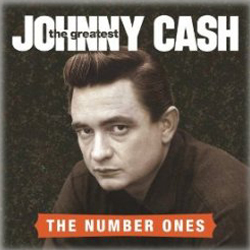
It’s also evidently “Buy More Johnny Cash” week. Cash wasn’t a martyr, but he managed to die in public to a Trent Reznor song – so that’s near-as, dammit. What’s remarkable isn’t so much how strong Cash’s final Rick Rubin period was, but how often it was so much stronger than the bulk of what he recorded for Columbia during his four decades with the label. There’s a reason that most of the recently-unearthed Cash (notably the Bootleg series) focuses on his scrappy youth and immediate post-Sun period: aside from the occasional live prison recording, the man put out a lot of undifferentiated C&W sludge in the 60’s, 70’s, and 80’s. He wasn’t a writer, and had the country gentleman’s typical taste for the sentimental. Today’s audiences, who know him mostly for his Man in Black persona, opposition to Vietnam, drug problem, and famous middle-digit photo adorning dorm rooms and t-shirts, may be surprised how little of that persona was channeled into the music he made during the period covered by this week’s releases (which also include The Greatest: Country Songs, The Greatest: Gospel Songs, and The Greatest: Duets); that astonishing voice of Grand Canyon gravel is frequently the only hint of the man’s dark, restless spirit. It’s no coincidence that 1969’s novelty number, “A Boy Named Sue” is the last of these country Number Ones that made any dent at all in the pop charts (and I can tell you from firsthand knowledge that getting 1985’s “Highwayman” to #1 on the country charts had very little to do with its actual sales figures), though he recorded for another thirty years. I can’t say you’d go wrong with spending eight bucks on this collection, though for a change of pace, there’s also the new concert recording, We Walk The Line: A Celebration of the Music of Johnny Cash, which features the usual suspects (Willie Nelson, Kris Kristofferson) alongside a few ringers (Iron & Wine, Carolina Chocolate Drops).
OTHER NOTABLE 8.7 RELEASES:
10 Years – Minus the Machine
Antony and the Johnsons – Cut the World
Balsam Range – Papertown
Chasing Violets – Outside Heaven
Colt Ford – Declaration of Independence
Cruxshadows – As The Dark Against My Halo
Everyone Dies in Utah – +//- (Polarities)
Keith Jarrett, Jan Garbarek, Palle Danielsson and Jon Christensen – Sleeper: Tokyo, April 16, 1979
Branford Marsalis – Four Mf’s Playin’ Tunes
Marcus Miller – Renaissance
Graham Parker & The Rumour – Live At Rockpalast
The Reverend Peyton’s Big Damn Band – Between the Ditches
Redd Kross, Researching the Blues
Mitch Ryder – Live At Rockpalast
Sixpence None The Richer – Lost In Transition
Los Straitjackets – Jet Set
The Trishas – High, Wide & Handsome
Elle Varner – Perfectly Imperfect
Rob Zombie – Rob Zombie’s Mondo Sex Head
The Zombies – Live In Concert At Metropolis Studios
PERSONA 4: ARENA (360, PS3)

This is weird. In an awesome way. Persona 4 is one of the best RPGs ever made and Arc System Works make some of the most beautiful 2D art I’ve ever seen. It’s a strange, wonderful marriage. I would never have guessed the first (and probably only) Persona game this generation would be a 2D fighter. And it’s good. Really good. It’s a gorgeous, fluid fighter that is actually a full, proper story sequel to Persona 4. All the aesthetic trappings of Persona and Arc are here at their shiny, next gen best. Despite 2D limitations, this might be the prettiest game of the year. And the music is exactly what you’d expect from the guys who made Guilty Gear. A fighting game is a hard sell at sixty dollars, but Atlus and Arc System Works have produced a nice followup to one of my favorite games and a feature-rich 2D fighter at the same time, and that makes for an easy decision for fighting fans – and anyone who spent 100 hours with Chie and Teddie.
There you go.
FIN.
